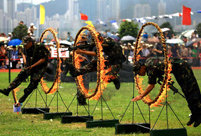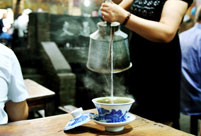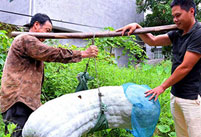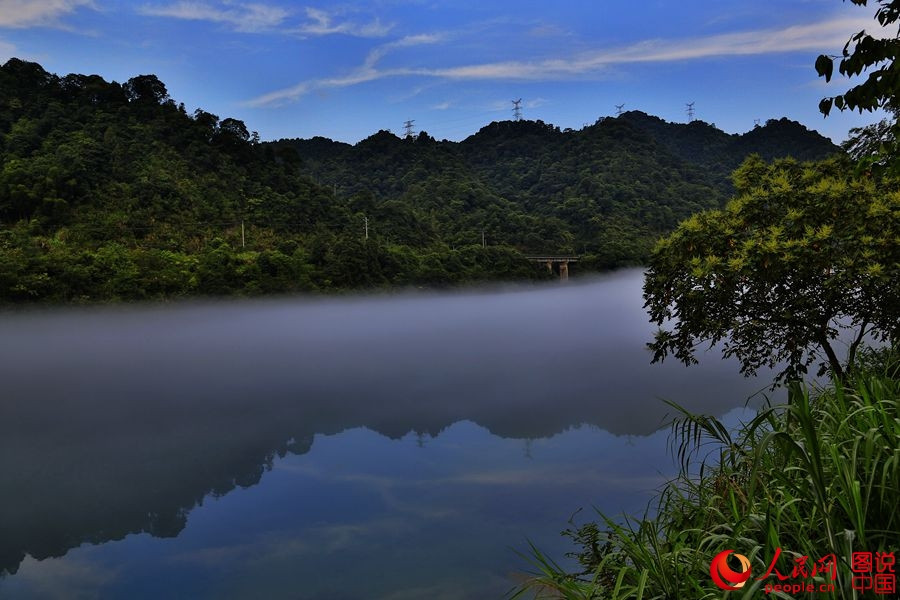 Vintage cars show kicks off in London
Vintage cars show kicks off in London
 Gorgeous scenery in NE China
Gorgeous scenery in NE China
 Picturesque Barkol grassland in Xinjiang
Picturesque Barkol grassland in Xinjiang
 Small Wild Goose Pagoda - A World Cultural Heritage Site along the Silk Road
Small Wild Goose Pagoda - A World Cultural Heritage Site along the Silk Road
 Maritime Silk Road Luxuries of the Han Dynasty
Maritime Silk Road Luxuries of the Han Dynasty
 Ciao! Chinese beauties!
Ciao! Chinese beauties!
 An eye feast: BFA freshmen registration
An eye feast: BFA freshmen registration
 Top 10 most lavish weddings
Top 10 most lavish weddings
 Most amazing chi-pao beauties
Most amazing chi-pao beauties
 Chinese lingerie brand arrives in Las Vegas
Chinese lingerie brand arrives in Las Vegas
8.15, remembrance of the Chinese suffering and victory over Japanese invasion
On August the 14th, 1945, the Japanese emperor Hirohito expressed "unconditional acceptance of the Potsdam Proclamation". One day later, the Emperor announced the Japanese government formally surrendered.
69 years have passed, but Japanese militarism hasn’t dispersed. Prime Minister Shinzo Abe and the right-wing forces in Japan have denied Japan's historical aggression against China, visited the Yasukuni Shrine, gone on to question the Kono Statement, and denied that the Nanjing Massacre ever occurred.
A huge volume of evidence has revealed the crimes that the Japanese army committed during its war against China.
The Central Archives of China has recently released files on the confessions of the Japanese war criminals. The confessions have disclosed the atrocities of the Japanese army.
Suzuki Keiku,lieutenant general and commander of the 117th Division, said in his written confession in July 1954 that based on his memory alone, 5.470 Chinese people were killed, and the houses of 18,229 Chinese households were burned down or damaged. The actual number may be much higher.
The number of women and girls forced into sexual slavery by the Japanese army is estimated to be as low as 20,000, which could be as many as 400, 000.
Japanese militarists not only caused a disaster in China, but also brought traumas to people of the world.
Fred Seiker, a British WWII veteran wrote a book about his experiences.
Lest We Forget, the book details the horrors he saw as a Japanese prisoner of war.
About 180,000 Asian civilian laborers and 60,000 Allied prisoners of war worked on the Thai-Burma Railway built to carry Japanese forces. Of those, an estimated 90,000 Asian civilians and 12,399 prisoners of wars died as a result of the project.
However, some forces in Japan have denied historical facts.
Despite that, we’ve also noticed voices in Japan that values justice and truth.
Shigenori Nishikawa has been researching on crimes committed by the Japanese invaders. "I am sorry to say that many Japanese people know little about the terrible crimes committed by the Japanese army during the Japanese War of Aggression against China. The atrocities are unspeakable.”
Nishikawa took out a book he usually refers to and said that the Japanese army carried out the infamous extermination policy of "burn all, kill all and loot all".
The Chinese people remember August 15 as a victory day over the Japanese invasion. This was the day when a nation that had lived under a century of enslavement to foreign powers finally rid itself of its oppressors.
The past, if not forgotten, can serve as a guide for the future. The Japanese politicians’ clinging to their negative legacies of militarism would only prevent a better future for Japan.
 Military training in Hong Kong
Military training in Hong Kong Teahouses in Chongqing: Worship to the leisure lifestyle
Teahouses in Chongqing: Worship to the leisure lifestyle Giant white gourd weighing 87 kilograms appears in SE China
Giant white gourd weighing 87 kilograms appears in SE China Advanced arms help to safeguard China-ASEAN Expo
Advanced arms help to safeguard China-ASEAN Expo Leading director Wang Quan'an detained for 'buying sex'
Leading director Wang Quan'an detained for 'buying sex' Heaven on earth: Dongjiang Lake in Hunan
Heaven on earth: Dongjiang Lake in Hunan Mixed reaction to smartphone sidewalk
Mixed reaction to smartphone sidewalk Amazing aerial photos of China's Xisha Islands
Amazing aerial photos of China's Xisha Islands Top 10 world's highest-paid models 2014
Top 10 world's highest-paid models 2014 Lingerie show at 2014 Miss China
Lingerie show at 2014 Miss China Songstress Li Xianglan dies at 94
Songstress Li Xianglan dies at 94 Police recruiting posters
Police recruiting posters Anshun Daxi- Living fossil of Chinese drama
Anshun Daxi- Living fossil of Chinese drama Urban farmers in China
Urban farmers in China 'Firepower-2014 Weibei'military exercise
'Firepower-2014 Weibei'military exerciseDay|Week|Month